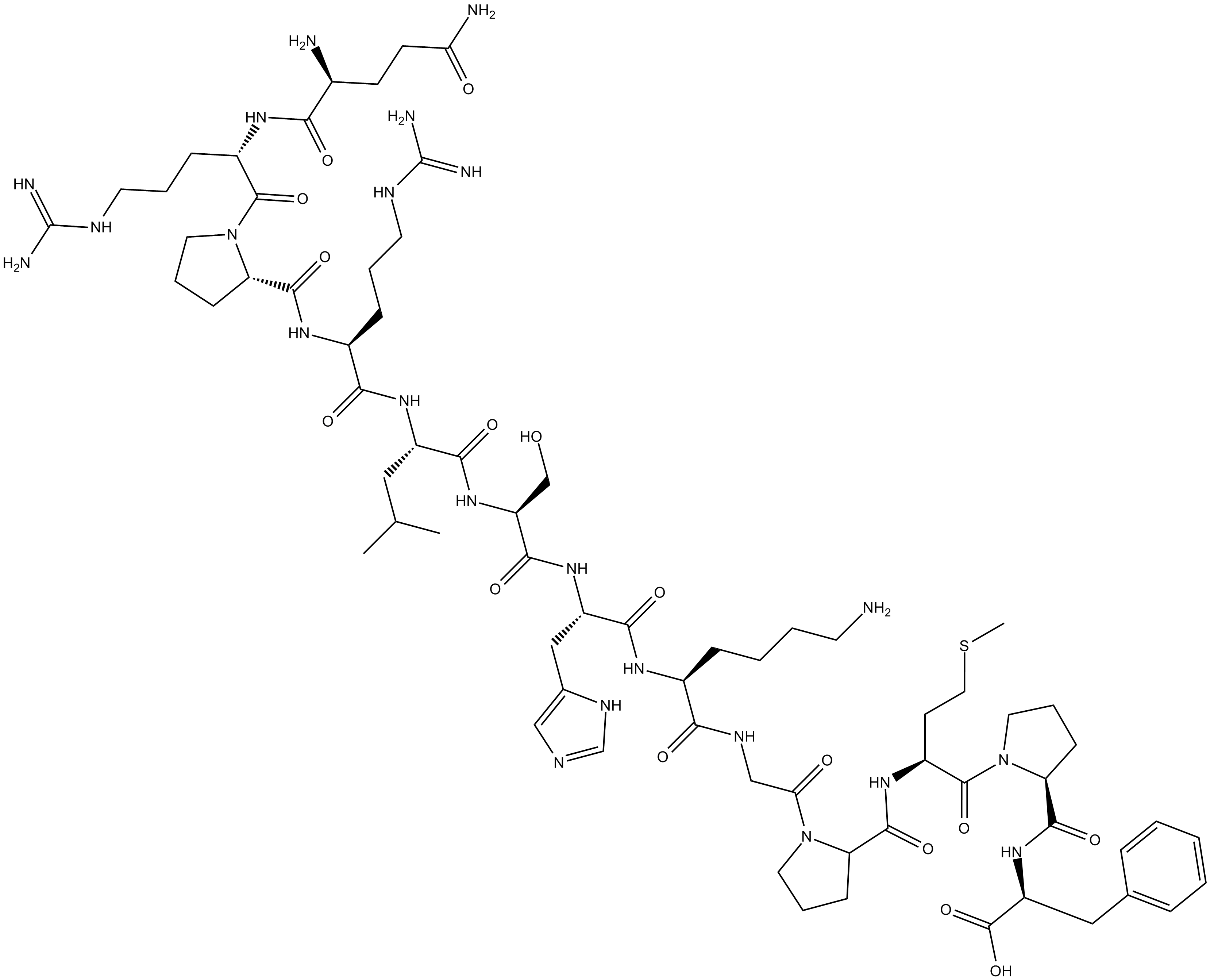Apelin-13 |
| Catalog No.GC10284 |
Apelin-13 is a peptide known as the ligand of the G-protein-coupled receptor APJ.
Products are for research use only. Not for human use. We do not sell to patients.

Cas No.: 217082-58-1
Sample solution is provided at 25 µL, 10mM.
Apelin-13 is a peptide known as the ligand of the G-protein-coupled receptor APJ. [1]. Apelin-13 activated this G protein-coupled receptor with an EC50 value of 0.37 nM [2]. Apelin has been shown to be involved in the regulation of cardiovascular and fluid homeostasis, food intake, cell proliferation, and angiogenesis [1].
Apelin-13 was shown to inhibit insulin secretion stimulated by high glucose concentrations (10 mM) or potentiated by GLP-1 in INS-1 cells [3]. Apelin-13 at 200 nM can enhance H9c2 cell proliferation, which is mediated by the ERK1/2 and Akt signaling pathway [4].
Apelin-13 treatment significantly lowers blood glucose and protects HFD mice from hyperinsulinemia [5]. There are some contradictory reports about the effects of apelin-13/APJ on hypertension. Intraperitoneally administered Apelin-13 reduces blood pressure in hypertensive rats by inhibiting renin-angiotensin system [6]. Chronic infusion of apelin-13 into the paraventricular nucleus induces hypertension through increasing the levels of plasma norepinephrine and arginine vasopressin in normotensive rats [7].
References:
[1]. Castan-Laurell I, Dray C, AttanÉ C, et al. Apelin, diabetes, and obesity[J]. Endocrine, 2011, 40(1): 1-9.
[2]. Tatemoto K, Hosoya M, Habata Y, et al. Isolation and characterization of a novel endogenous peptide ligand for the human APJ receptor[J]. Biochemical and biophysical research communications, 1998, 251(2): 471-476.
[3]. Guo L, Li Q, Wang W, et al. Apelin inhibits insulin secretion in pancreatic β-cells by activation of PI3-kinase-phosphodiesterase 3B[J]. Endocrine research, 2009, 34(4): 142-154.
[4]. Yin L, Zhang P, Li C, et al. Apelin?13 promotes cell proliferation in the H9c2 cardiomyoblast cell line by triggering extracellular signal?regulated kinase 1/2 and protein kinase B phosphorylation[J]. Molecular Medicine Reports, 2018, 17(1): 447-451.
[5]. AttanÉ C, Foussal C, Le Gonidec S, et al. Apelin treatment increases complete Fatty Acid oxidation, mitochondrial oxidative capacity, and biogenesis in muscle of insulin-resistant mice[J]. Diabetes, 2012, 61(2): 310-320.
[6]. Akc?lar R, Turgut S, Caner V, et al. Apelin effects on blood pressure and RAS in DOCA-salt-induced hypertensive rats[J]. Clinical and Experimental Hypertension, 2013, 35(7): 550-557.
[7]. Zhang F, Sun H J, Xiong X Q, et al. Apelin©\13 and APJ in paraventricular nucleus contribute to hypertension via sympathetic activation and vasopressin release in spontaneously hypertensive rats[J]. Acta physiologica, 2014, 212(1): 17-27.
Average Rating: 5 (Based on Reviews and 32 reference(s) in Google Scholar.)
GLPBIO products are for RESEARCH USE ONLY. Please make sure your review or question is research based.
Required fields are marked with *




















